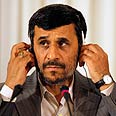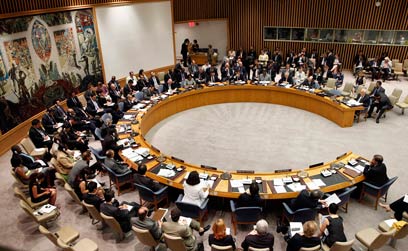
UN readies Iran sanctions vote
Western diplomats expect 12 UN Security Council members, including all the five that hold vetoes, to vote for resolution. Clinton: New sanctions would be toughest yet
After months of tough negotiations, Security Council powers said on Tuesday they were set to vote on a resolution that would impose a fourth round of United Nations sanctions on Iran over its nuclear program.
US Secretary of State Hillary Clinton said that the fourth round of sanctions due for a vote on Wednesday would be the toughest Tehran has faced.
Mexico's UN Ambassador Claude Heller, current president of the 15-nation Security Council, told reporters it was due to meet for the vote at 10 am EDT (1400 GMT) Wednesday, after broad agreement was reached on who would be targeted in Iran.
US Defense Secretary Robert Gates said the expected passage of the resolution would provide a springboard for individual countries to take their own tougher measures against Tehran for refusing to halt uranium enrichment.
Iran, however, warned its close trading partner Russia against joining Western nations in backing new punitive measures against the Islamic Republic.
Western diplomats expect 12 council members, including all the five that hold vetoes, to vote for the resolution. Turkey, Brazil and Lebanon are not expected to support it.
Asked if the possibility of two or three 'no' votes would amount to a failure for the United States, Clinton told reporters: "I'm not going to comment on something that hasn't occurred yet. The vote is scheduled for tomorrow.
"These are the most significant sanctions that Iran has ever faced," she added. "The amount of unity that has been engendered by the international community is very significant."
State officials in Jerusalem noted that Israel was being briefed on the matter by the US and its allies in the Security Council.
"According to estimates, Ankara's vote will not necessarily be affected by the diplomatic developments following the Gaza flotilla, but by the overall strategy," one of the officials said, but stressed that "all eyes are on New York in order to determine whether the Gaza flotilla was indeed a Turkish provocation aimed at diverting the global attention from Iran's nuclear program."

Iranian diplomacy fails. UN Security Council (Photo: Reuters)
The UN resolution would target 40 new Iranian entities, including 15 linked to Iran's powerful Revolutionary Guard.
An annex to the draft resolution would also add one individual to the previous list of 40 Iranians subject to an asset freeze – Javad Rahiqi who heads the Atomic Energy Organization of Iran's Esfahan Nuclear Technology Center.
The annex, obtained Tuesday by The Associated Press, also includes 22 entities involved in nuclear or ballistic missile activities and three entities linked to the Islamic Republic of Iran Shipping Lines.
Western diplomats told Reuters on condition of anonymity there were currently one individual and 41 entities, including a bank, blacklisted in the draft resolution. They identified the individual as Javad Rahiqi, head of a nuclear center in Isfahan where Iran runs a uranium processing facility.
Although key council members have agreed on the list, the United States and China still were discussing at least one entry, which means the blacklist could expand or shrink slightly before the vote, the diplomats said.
Those added to an existing UN blacklist for suspected ties to Iran's nuclear or missile programs will face international travel bans and asset freezes.
"It's a much tougher resolution than any of us had predicted we'd get," a Western council diplomat said.
The draft resolution was the product of months of talks between the United States, Britain, France, Germany, China and Russia. The four Western powers had wanted tougher measures – some targeting Iran's energy sector – but Beijing and Moscow worked hard to dilute the proposed steps.
'Appropriate reaction from Iran'
The resolution calls for measures against new Iranian banks abroad if a connection to the nuclear or missile programs is suspected, as well as vigilance over transactions with any Iranian bank, including the central bank.
It also would expand the UN arms embargo against Tehran and blacklist some entities controlled by Islamic Republic of Iran Shipping Lines and the Islamic Revolutionary Guard Corps.
A senior Iranian official warned of an "appropriate reaction" against world powers if they imposed new sanctions. An Iranian lawmaker said Tehran would reconsider its cooperation with the UN nuclear watchdog if the sanctions went ahead – a threat Tehran has made before.
Iran insists its nuclear program is peaceful and not aimed at making atomic weapons, as the West suspects. It has defied five Security Council resolutions demanding it stop enriching uranium, which can produce fuel for bombs or reactors.
Gates said in London that individual nations likely would move quickly to pass measures that go beyond the UN sanctions.
"One of the many benefits of the resolution is that it will provide a legal platform for individual nations to then take additional actions that go well beyond the resolution itself," he said. "I believe that a number of nations are prepared to act pretty promptly.
"I do not think we have lost the opportunity to stop the Iranians from having nuclear weapons."
Iran's President Mahmoud Ahmadinejad admonished Russia at a news conference in Istanbul, where he was attending a summit along with Russian Prime Minister Vladimir Putin, to take care "not to be on the side of the enemies of the Iranian people."
Putin, who said he expected to meet Ahmadinejad on Tuesday in Istanbul, said the sanctions should not be excessive.
"We will have an opportunity to discuss these problems if my Iranian colleague will have such a need," he said, adding there there should be no obstacles to the "development of Iran's peaceful nuclear energy."
The Iranian president said a nuclear fuel swap deal agreed by Tehran with Turkey and Brazil was an opportunity that would not be repeated. The deal, which has been rejected by the West as too little too late, was intended to defuse the crisis.
Turkey and Brazil last month revived parts of a UN-backed offer for Tehran to part with 1,200 kg of low enriched uranium in return for special fuel rods for a medical research reactor. They say the deal removes the need for sanctions.
Ahmadinejad said the swap deal was a one-time offer.
Turkish President Abdullah Gul urged Ahmadinejad on Monday to tell the international community his government was ready to cooperate and solve the dispute over its nuclear program.
Yitzhak Behorin in Washington contributed to this report










